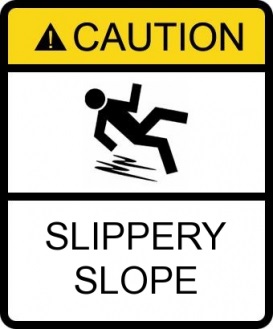Beware the Slippery Slope

 The "slippery slope" argument tactic. It is THE go-to reasoning in politics these days it seems. Reason and logic have been thrown out the window in favor of worst-case scenarios. This in not exclusive to one party either. It seems both parties are equally responsible for this...although the popular examples right now come from the Republican/Conservative side in the Gay Marriage Debate and discussions on Gun Control. These retorts are so loud and numerous that they serve as an impediment to any actual conversation on the issue.
The "slippery slope" argument tactic. It is THE go-to reasoning in politics these days it seems. Reason and logic have been thrown out the window in favor of worst-case scenarios. This in not exclusive to one party either. It seems both parties are equally responsible for this...although the popular examples right now come from the Republican/Conservative side in the Gay Marriage Debate and discussions on Gun Control. These retorts are so loud and numerous that they serve as an impediment to any actual conversation on the issue.
A "slippery slope" argument is simply stating that if A is allowed to happen, then B...and C...and perhaps all the way to Z could, or are likely to, occur. Think of a popular policy debate in Washington in the past few years and there has likely been a vocal "slippery slope" attached to it. DirecTV has even used the "slippery slope" as a humorous ad campaign. A perfect example is below:
There is a reason laws exit. The very job of those we elect is to set the boundaries of those laws. The "slippery slope" most certainly was employed when discussion of the 14th and 19th Amendments took place, yet reason and logic eventually won out. Today, with everyone seemingly have a greater voice thanks to social media, the "slippery slopes" are everywhere. They are seemingly employed with every piece of controversial legislation. They are espoused on the 24-hour news stations and then re-shown on Comedy Central's Daily Show or Colbert Report. Soon the "slippery slope" becomes the discussion rather than the original idea itself...and perhaps that is the point of those who start the slippery slope to begin with*.
We should be moving beyond this though. The discussions in Washington and across the various legislatures spread throughout our country are too important to be bogged down in the mud by illogical scary scenarios. We complain that "our Government isn't working for us" when in truth we are becoming a reflection of the very thing we lament.
Perhaps that is something we should be looking at next time we go to the polls. Does the person we are choosing to vote for employ such tactics or do they use logic and reasoning, trying to rise above the fray to represent all of those in their district and state?
*Yes, there are times a "slippery slope" can actually serve as a useful tool when debating in that it brings up the discussion of boundaries. In the instance of this "slippery-slope", "The Federal Government lowered the voting age to 18, why not lower it to 17...or 16", the point can be made that 18 constitutes legal adulthood according to the Federal Government. The problem comes in when the person making the point fails to comprehend the boundaries that are elucidated or makes such ridiculous use of the slippery slope that its obvious they are unwilling to listen to rational discussion on the issue.


